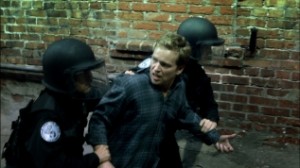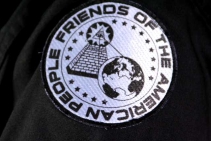 With each passing week it seems that we hear more controversy over our privacy online and the systems being put into place, particularly on social media platforms, that enable an increasing amount of data to not only be collected about us but publicly displayed. For this reason, I thought it would be good to go back to an instructional post that will look at some of the ways you can reign in your digital footprint if you wish.
With each passing week it seems that we hear more controversy over our privacy online and the systems being put into place, particularly on social media platforms, that enable an increasing amount of data to not only be collected about us but publicly displayed. For this reason, I thought it would be good to go back to an instructional post that will look at some of the ways you can reign in your digital footprint if you wish.
Your digital footprint is the total sum of the data out there that is connected in an identifiable way to you as an individual. This has both public and private aspects: examples of private aspects are government databases, and public ones are usually online communications or profiles. Being aware of the information about us, particularly that which is publicly available, is going to become an increasingly important skill to develop, and part of this awareness is an understanding of just where and how you can control these elements.
Unfortunately, it is increasingly true that you can’t control these things if you actually want to use services such as those provided by Google or Facebook (and you definitely can’t when it comes to government databases); however, we are thankfully still at the point where most public focused, and even quite a bit of corporate, data can still be controlled if you take a few simple steps.
Learn how to control your interface
The place to begin with is actually the element you have the most control over, the physical device or software that you are using to go online. Learning how to use your firewall and browser security settings when going online is absolutely vital to building a solid foundation for digital privacy and ownership. Combine this with an understanding of how websites work (for example, Cookies) and the data that is being traded back and forth when you visit one and you are on good standing.
Search for yourself online
Yes, I realise it’s kind of a running joke of narcissism to run an internet search on yourself; but the fact is that if you want to take control of your digital footprint you need to know just what is out there. Of course, you are only going to be able to find those components that are publicly accessible – but at this point those are the ones worth focusing on. Don’t just search for your name (particularly if it’s a common one), you have to search for your name and add various platforms/topics that you know you have discussed online in some fashion. Add to this any commonly used aliases in order to get a more complete picture (pay particular attention to points where these aliases might overlap, allowing a connection to be made). You will often be surprised just how long stuff sticks around. When I did this, I found a guest-book entry from last century (remember website guest books? how quaint)…
Delete old accounts or contact websites
Once you know what’s out there, you can start trying to get rid of it (if you want to). For online forums, if you can still remember your password then you can log in and start scrubbing clean manually. You should do this particularly for any identifying information that you might have put out there, or even delete the account entirely if you no longer intend to use it (AccountKiller is useful for this, because it’s not always straight forward).
An alternative to deleting individual posts on forums is often to contact the site administrators and ask if your account can be deleted, along with all of the messages associated with it. Many websites won’t like doing this for legacy reasons (it makes archived conversations difficult to follow when messages are missing), but if you ask nicely they’ll often do things like change the username or other options that distance the information from your digital footprint. Also keep in mind that posts you make on Facebook groups are now publicly searchable (even if you made them years ago), so it might be time to go back and get rid of some of them because chances are you used your full name for Facebook, right?
Vary the information you provide
Part of taking control of your digital footprint comes from preventative measures, and one of the easiest and most effective ones is to vary the data you give for particular items. For example, when you create usernames or login accounts don’t always use the same ones (particularly for public forums or comments); also keep in mind that you don’t always have to give your correct birth-date to just any random commercial company (yes, even Facebook), so have a few fake ones that you hand out. There are countless other examples, but the point is to make your data more difficult to correlate with just one single individual.
There are likely many people out there that have your name, but few of them share the same birthday; fewer still birthday and city; fewer even still use your online handle etc. Varying the data is about making it more difficult to trace connections, so wherever it is legal to do so you should be doing it unless you want everything you say to be connected directly to you and in the public domain. It should also be obvious by now, but don’t use the same password for everything (!) – if you must reuse passwords at least create a layered system that gets more secure and less used as you move through it.
Pay attention to privacy settings
This one applies mostly to social media platforms, and in particular to the anti-privacy strategy of Facebook, but is also relevant to corporate databases that you might sign up to. If you haven’t already checked your privacy settings/conditions (all of them, not just the basic ones), then you are probably in for a bit of a surprise about the amount of information you are allowing to be shared (or in the case of corporations, sold) about you.
Common things which people don’t consider are: allowing friends of friends to access your data; allowing third-party companies to access your data; allowing your listings to show up in public searches; allowing people to indicate your current location; grouping your contacts into different categories of transparency (separate work from play!); signing up for third-party offers and information; or giving over your name and address to just anyone who asks for it online or off. Reigning in your social media privacy settings alone can go a long way towards controlling your overall digital footprint these days, so pay close attention to it.
Actively create your footprint
Taking control over something also means to be proactive about its creation, rather than just being involved in its deletion. One of the best ways for you to control your digital footprint is to start with a clear idea in mind of what you want to be part of your public reputation and start developing it. Social media profiles such as those on Linked In, Facebook, or Twitter; YouTube channels with video of yourself; Blogs and Websites etc.
All of these things are about the active creation of a digital footprint that you have designed rather than inherited. You do have to keep in mind, particularly if you are young and outspoken, that you might change your view on things over time and be left with a clean up problem somewhere down the line (which is in large part what this article is discussing) – but in a world where online communication and representation is becoming increasingly unavoidable, maybe the best way of controlling your digital footprint is to embrace it wholeheartedly. The point here really is to presume that everything you do online will be publicly accessible and connected to you, thereby making you take pause for thought before adding to the vast amount of data being created on a daily basis. This might not truly be the case, particularly if you follow some basic rules, but it can’t hurt to presume it nonetheless.
Be aware of what a digital footprint is
The fact is that you are never going to be able to get rid of your digital footprint entirely – it actually exists in today’s society from the moment you are born and those details are put into the national register. The amount of privately collated data is just staggering, and in many ways unfortunately unavoidable. From a public data perspective, in many instances it can be quite beneficial to have easily identifiable information out there; particularly if you are trying to develop a reputation for personal or professional reasons. What you must always keep in mind, however, is that there are certain types of information that can be used against you in negative ways (addresses, bithdays, full names, current location, photos, outspoken views).
Being aware of the information you are putting out is the first necessary step in deciding on whether you want it to be there or not. Unfortunately, current social media platforms such as Facebook often try and slip these things past you without properly explaining their true implications. Your digital footprint can come back to haunt you when you are going for those job or university interviews; being unaware of it can also lead to issues such as identity theft, online stalking or social profiling to name but a few. The key is to be informed and aware. You might not be able to control many things that are already part of your digital footprint, but at the very least you can control some of the things that might be added to it in the future. Taking control of your digital footprint is an important skill to master as we head further into the information age, and by following the few steps above you can be well on your way.
These are just a few small and easy ways that you can take more ownership over your digital footprint – can you add any other useful tips to the list?




